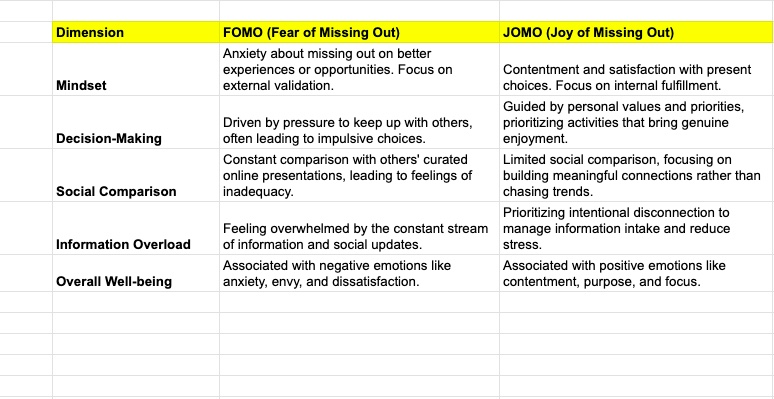How to Cultivate JOMO: A Practical Guide to achieving Disconnected Joy
Imagine scrolling through social media, bombarded by friends' weekend adventures and colleagues' accomplishments. A nagging feeling creeps in – are you missing out on something better?
This constant pressure to stay connected and keep up with everyone can be overwhelming. This experience exemplifies the pervasive influence of FOMO (Fear of Missing Out) in today’s hyper-connected world.
However, a recent trend has emerged that offers a refreshing alternative: JOMO (Joy of Missing Out). JOMO represents a shift in perspective, prioritizing intentional disconnection and finding satisfaction in the present moment.

Understanding JOMO
JOMO (Joy of Missing Out) counters the pervasive influence of FOMO. It describes the positive psychological state associated with intentionally disconnecting from the constant influx of information and social comparison. While the exact origin of the term remains debated, JOMO emerged in the early 2010s as a response to the anxieties fueled by social media and the pressure to be constantly “on.”
Common Misconceptions about JOMO
It’s important to distinguish JOMO from simple neglect of responsibilities. JOMO isn’t about burying your head in the sand or withdrawing entirely from social interactions. The core concept revolves around intentional disengagement. JOMO advocates for a conscious choice to prioritize activities and experiences that bring genuine fulfillment, even if they may not be outwardly glamorous or “social media-worthy.”
Can JOMO Be Bad for You?
Some may worry that embracing JOMO could lead to negative outcomes, such as social isolation or missing out on important opportunities. However, healthy JOMO is about intentional disengagement, not complete isolation. It involves making thoughtful choices about when to disconnect and when to engage. By doing so, individuals can maintain a healthy balance between social interactions and personal well-being. JOMO encourages a mindful approach to social and personal activities, ensuring that one’s mental health is prioritized without sacrificing meaningful connections.
JOMO vs FOMO: A Practical Comparison
Understanding the key differences between JOMO (Joy of Missing Out) and FOMO (Fear of Missing Out) is crucial for cultivating a balanced approach to social engagement and personal fulfillment. Here’s a table outlining the contrasting characteristics of these two concepts.

Benefits of JOMO
JOMO (Joy of Missing Out) offers a compelling alternative to the anxieties associated with FOMO (Fear of Missing Out). JOMO can cultivate a range of positive psychological and social outcomes by prioritizing intentional disconnection and focusing on what truly matters.
Reduced Stress and Anxiety
The constant barrage of information and social comparison inherent in FOMO can damage mental well-being. JOMO, in contrast, allows individuals to create a mental health sanctuary. By strategically disconnecting from overwhelming stimuli, JOMO promotes relaxation and reduces stress hormones like cortisol. This can lead to a significant improvement in mood, emotional regulation, and overall well-being.
Enhanced Focus and Productivity
FOMO’s constant notifications and distractions can significantly hinder our ability to focus and complete tasks effectively. JOMO fosters a more mindful approach to information intake. By creating periods of focused work without digital distractions, JOMO increases concentration, leading to improved productivity and a greater sense of accomplishment.
Strengthened Relationships and Deeper Connections
JOMO encourages a shift from quantity to quality in social interactions. While FOMO may lead to attending numerous social events out of obligation, JOMO allows for prioritizing meaningful connections with loved ones. This mindful approach to social engagement fosters deeper bonds and a stronger sense of belonging.
Improved Self-Awareness and Stronger Values
The constant social comparison driven by FOMO can obscure our own values and priorities. JOMO, by encouraging intentional disconnection, creates space for self-reflection. This allows individuals to reconnect with their inner selves, identify their core values, and make choices that align with what truly matters to them, leading to a greater sense of personal fulfillment.
How to Practice JOMO
By implementing these strategies, individuals can cultivate a sense of contentment and fulfillment, even while navigating the complexities of a digital world.
Identifying Your JOMO Values
The foundation of JOMO lies in identifying your core values. What truly matters to you? Is it spending quality time with loved ones, pursuing creative hobbies, or achieving professional goals? Understanding your values empowers you to make conscious choices that align with your authentic self. JOMO encourages prioritizing activities that resonate with these values, even if they may not be outwardly glamorous or garner social media attention.
Embracing JOMO in daily life requires a shift in perspective and strategic action. Here are some practical tips:
-
Digital Detox Strategies Schedule screen-free time daily, utilize phone apps to limit social media usage, and unsubscribe from unnecessary notifications.
-
Prioritization Techniques: Identify your core values and goals. Learn to decline commitments that don’t align with your values politely. Practice mindfulness and cultivate gratitude for the positive aspects of your life.
JOMO for Social Media Detox
Social media can be a double-edged sword. JOMO principles can help you navigate this platform mindfully. Consider limiting your daily check-ins, following inspiring and positive content creators, and curating your feed to reflect your values.
JOMO for Busy Professionals
Feeling overwhelmed by work demands? JOMO isn’t about neglecting professional responsibilities. It’s about fostering focus and efficiency. Schedule focused work periods with minimal distractions, prioritize tasks aligned with your career goals, and delegate or eliminate non-essential commitments.
JOMO for Introverts and Tech Enthusiasts
JOMO caters to diverse personalities. Introverts can leverage JOMO to create space for recharge and prioritize meaningful connections. On the other hand, tech enthusiasts can utilize JOMO to cultivate a more mindful and intentional relationship with technology.
By adopting these practices, JOMO empowers individuals to reclaim control of their time and attention, paving the way for a more fulfilling and less FOMO-driven life.
JOMO in the Workplace: Fostering Focus and Well-being
JOMO (Joy of Missing Out) transcends its benefits and extends to the professional sphere. By embracing JOMO principles in the workplace, organizations can cultivate a more focused, productive, and well-balanced work environment for their employees.
JOMO for Enhanced Productivity
The constant pressure to be “always on” and the fear of missing out on important work updates can harm focus and efficiency. JOMO offers a solution. By encouraging strategic disconnection from non-essential communication channels during focused work periods, JOMO allows employees to achieve a state of “deep work,” leading to improved productivity and higher quality output.
Benefits for HR Professionals
JOMO holds significant potential for Human Resource (HR) professionals. Understanding JOMO allows HR to develop policies and practices that promote employee well-being and reduce burnout. This could involve implementing flexible work arrangements, encouraging breaks and disconnection from work outside of business hours, and promoting mindfulness practices within the organization.
Implementing JOMO in Professional Settings
Integrating JOMO principles into the workplace requires a collaborative effort. Here are some strategies:
Communication and Transparency: Foster open communication about workload expectations and priorities. Encourage employees to communicate their needs for focused work time.
Technology Management: Explore tools and protocols for setting boundaries around communication after hours and during designated focused work periods.
Meeting Optimization: Prioritize essential meetings and streamline agendas to minimize unproductive meeting time. Encourage asynchronous communication whenever possible.
Culture of Well-being: Promote healthy work habits like taking breaks, encouraging physical activity, and fostering a supportive work environment prioritizing employee well-being.
By implementing these strategies, organizations can leverage JOMO to create a workplace environment that fosters focus, productivity, and a happier, healthier workforce.
JOMO and Mental Health
JOMO (Joy of Missing Out) offers a compelling approach to mental health in the digital age. By prioritizing intentional disconnection and focusing on what truly matters, JOMO can cultivate a range of psychological benefits.
Psychological Advantages of JOMO
Reduced Stress and Anxiety: The constant pressure to keep up with social media and the fear of missing out can be significant stressors. JOMO promotes practices like setting boundaries with technology and scheduling device-free zones, fostering relaxation and reducing stress hormones like cortisol. This can lead to a significant improvement in mood and emotional regulation.
Enhanced Self-Esteem and Self-Acceptance: Social media often presents a distorted reality, leading to feelings of inadequacy through social comparison. JOMO encourages mindful social media consumption and a focus on personal values. This shift in perspective fosters self-acceptance and a stronger sense of self-worth.
Increased Focus and Attention Span: The constant barrage of notifications and information overload fragments our attention. JOMO principles, like designated “deep work” periods, promote focused attention, improving cognitive function and a greater sense of accomplishment. JOMO as a Stress Management Tool:
JOMO can be a valuable tool in stress management strategies. By creating space for relaxation and activities that promote well-being, JOMO empowers individuals to cope with stress more effectively. This might involve practices like mindfulness meditation, spending time in nature, or pursuing hobbies that bring joy and reduce tension.
JOMO’s Impact on Anxiety and Well-being
The constant pressure to be “connected” and the fear of missing out can fuel anxiety. JOMO offers a powerful antidote. By promoting intentional disconnection and focusing on activities aligned with personal values, JOMO fosters a sense of control and reduces feelings of anxiety. This, in turn, contributes to a greater sense of well-being and a more fulfilling life.
Parting Thoughts
In a world increasingly dominated by the pressures of staying connected and keeping up, the concept of JOMO (Joy of Missing Out) offers a refreshing alternative. JOMO encourages intentional disconnection and focuses on what truly matters, fostering reduced stress, enhanced productivity, deeper relationships, and improved self-awareness.
By embracing JOMO, individuals can reclaim control over their time and attention, creating a healthier balance between social engagement and personal well-being. Implementing JOMO principles in daily life and professional settings can lead to a more fulfilling, less anxiety-driven existence, paving the way for a happier, healthier future.
Essential Reads
Overcoming Procrastination with Neuroscience
How to Deal with Human Irrationality in the Workplace
Imposter Syndrome: A Guide to Understanding and Overcoming It
A Guide to DBT Interpersonal Effectiveness Skills
How to Train our Brains to Be More Patient
Journaling Prompts to Overcome Workplace Jealousy
Want to stay connected? Here’s our twitter.
Or subscribe to our monthly newsletter containing tools for body, mind, and goal.